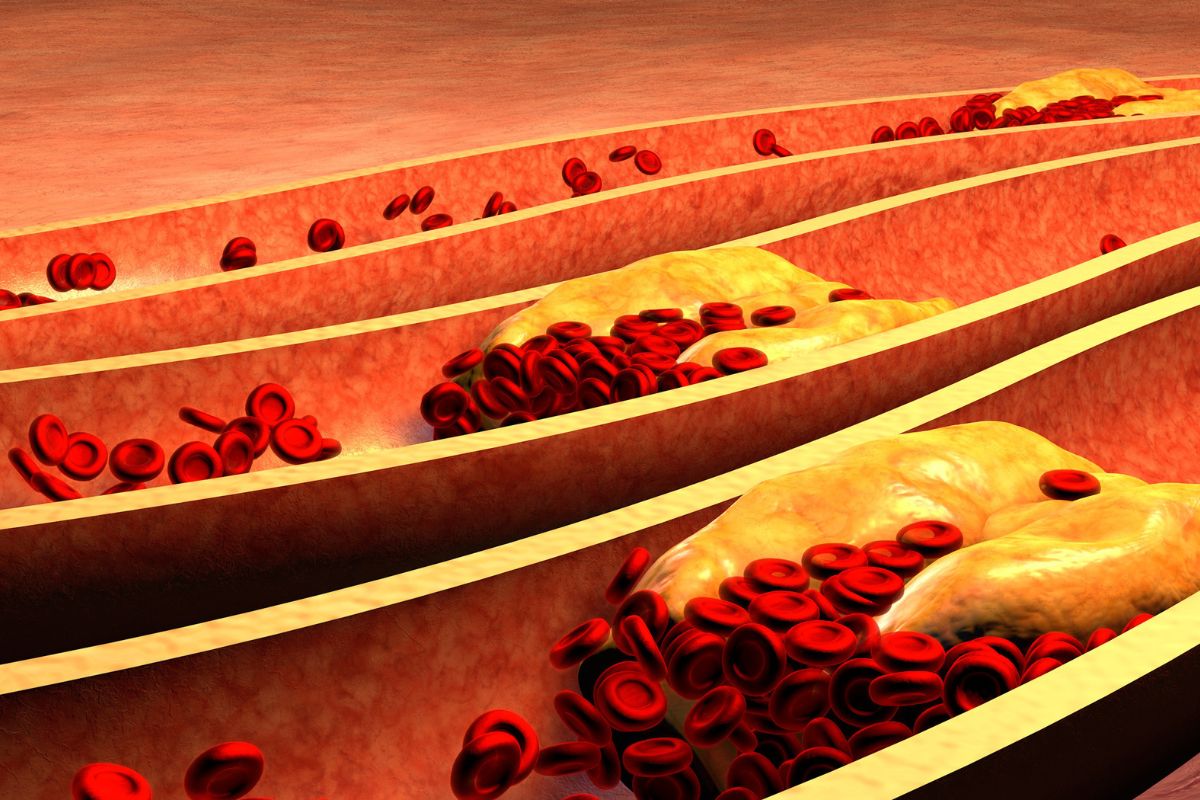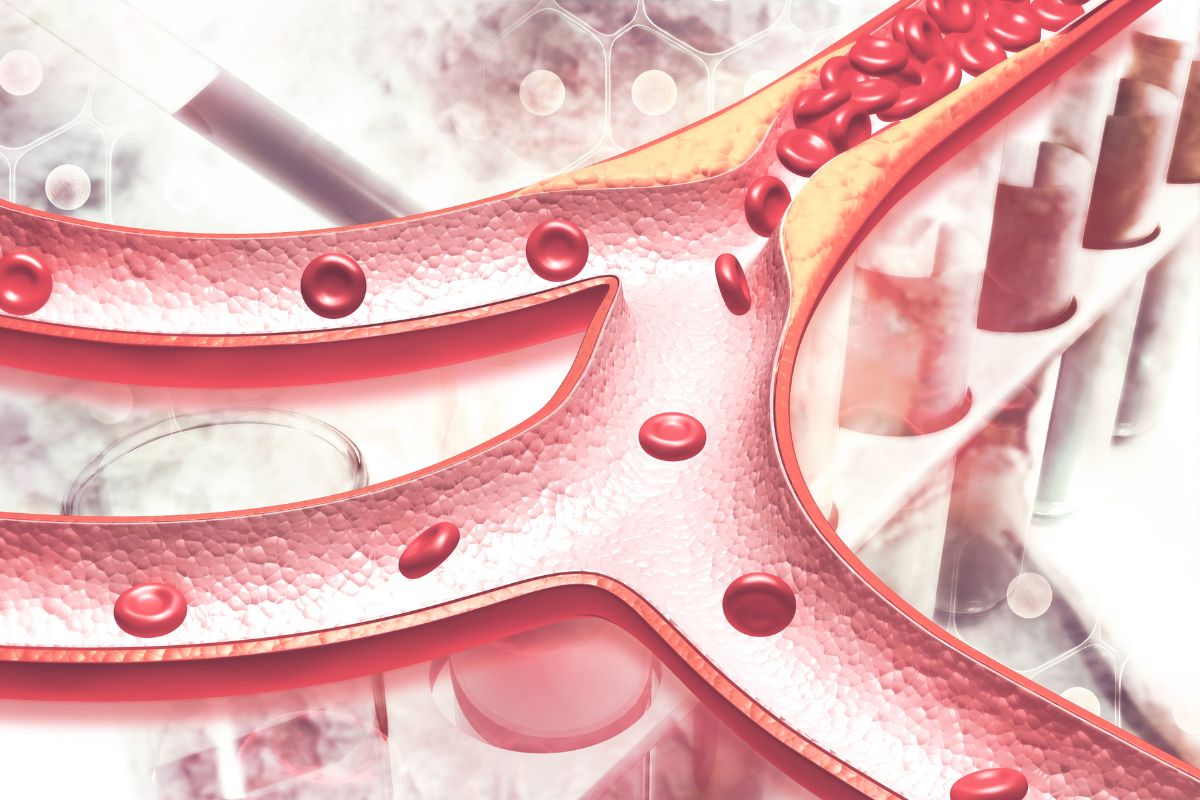Arterial Plaque is also known as clogged arteries and this condition often affects almost half of the American population aged between 45 years to 84 years.
It is a direct result of a condition called Atherosclerosis.
If you have recently been diagnosed with arterial plaque and want to learn more about it, whether it can be reversed or reduced, then continue reading the below to learn more.
What Is Arterial Plaque

The build-up of arterial plaque is the cause of Atherosclerosis which affects the arteries.
Arterial plaque is a result of blood cells, fat, cholesterol, and other substances within the blood building up over time ultimately forming a plaque-like substance that lines the arteries, causing them to narrow.
The arteries are responsible for transporting oxygenated blood throughout the body.
Healthy arteries have smooth linings and blood can freely flow.
When arterial plaque occurs, arteries become thinner and the blood can no longer flow as freely, this is when most people will begin to feel the effects of arterial plaque.
Many people don’t even realize that they have atherosclerosis until they start to notice symptoms, such as shortness of breath, pains in the chest, palpitations of the heart, nausea, or heavy sweating.
These symptoms are often common in people over the age of forty which makes this condition difficult to diagnose.
When these symptoms persist people will often seek medical help and arterial plaque may be found.
In worst-case scenarios, people will not realize the conditions their arteries are in until it is too late and they are hospitalized as a result of a cardiac incident.
Those who have arterial plaque are at a higher risk of suffering from a heart attack or stroke as well as developing heart disease.
To check for arterial plaque non-invasive tests are used, such as a CT coronary angiogram which gives doctors a view of the arteries and allows any blockages in the arteries to be highlighted.
Arterial plaque is often treated through surgery. A stent is placed in the affected arteries to stretch the artery and allow blood to flow freely again.
The stent is put in place using a catheter and this surgery is often performed as keyhole surgery.
If the damage caused by the plaque is severe doctors may decide on a more aggressive treatment course such as bypass surgery.
Some medications can be prescribed, but again this depends on the severity of the case and each patient and their needs.
Arterial plaque can also be linked to other heart conditions such as Coronary Heart Disease, but it can also be caused by diabetes, smoking, high cholesterol or triglyceride levels, and overconsumption of saturated fats.
It can also be linked to family history and so it is important to know the health history of your close relatives, especially the health of their hearts.
Can Arterial Plaque Be Reversed Or Reduced
As arterial plaque is a hard substance built-up over a period of time it is not possible to simply reverse or reduce it.
As mentioned above, there are ways to treat this condition but once diagnosed the diagnosis cannot be reversed.
The focus turns to stabilizing and preventing the further growth of arterial plaque and doctors work with patients to create a plan to help them live with this condition.
Some people may find that through hard work they may be able to change their overall health which will help to prevent many of the possibilities linked to arterial plaque.
How To Prevent Further Growth Of Arterial Plaque

Getting any type of medical diagnosis can be scary but in most cases, there are steps that can be taken that you have power over and when you are diagnosed with Atherosclerosis or found to have arterial plaque there are lots that you can do to prevent your conditioning from worsening.
Below are five basic steps that can be followed to help to prevent the further growth of arterial plaque as well as benefit your overall health.
Step One: Stop Smoking
If you are a smoker then it is hugely important that you stop as smoking is one of the main causes of arterial plaque.
Speaking with a medical professional can hugely benefit anyone looking to cease smoking as they will help you to create a quitting plan that you will be able to stick to.
Step Two: Know Your Blood And Cholesterol Levels
High blood pressure and cholesterol can also cause arterial plaque and so working to lower both will prevent the further growth of arterial plaque.
This may mean getting prescribed medication to help lower these levels from a medical professional or implementing simple changes in your diet.
Step Three: Adopt A Heart Healthy Diet
Adding heart-healthy foods such as fish, poultry, nuts, fruits, vegetables, whole grains, and healthy oils into your diet will enable you to help your heart from within.
Limit red meat, heavy dairy products, and fried food for the best results.
Step Four: Exercise Daily
Exercise doesn’t have to be scary, a simple 40-minute walk every day, or at least three times a week, will hugely impact your heart health and make you feel better than ever.
Arrange to walk with a friend or family member to make it a more enjoyable, social event.
Step Five: Lose Excess Weight
Having extra weight causes stress to the heart. Shedding this excess weight will take the stress off your heart and also lower your cholesterol.
Final Thoughts
While arterial plaque cannot simply be melted away, reduced, or reversed there are things that can be done to prevent the further build-up of plaque by instilling some of the healthy lifestyle changes mentioned above into your daily routine.
Arterial plaque can trigger life-threatening medical incidents and so it is important to liaise with your medical professional to learn how to treat your condition as well as how to lead a healthy life with your newly diagnosed condition.
As medicine continues to advance new medications and treatments for arterial plaque continue to be researched.
- Understanding Male Reproductive Health: A Complete Guide - February 2, 2025
- Simple Healthy Skin Habits for Radiant Skin - December 6, 2024
- Unlocking the Connection Between Nutrition and Mental Health - December 3, 2024








